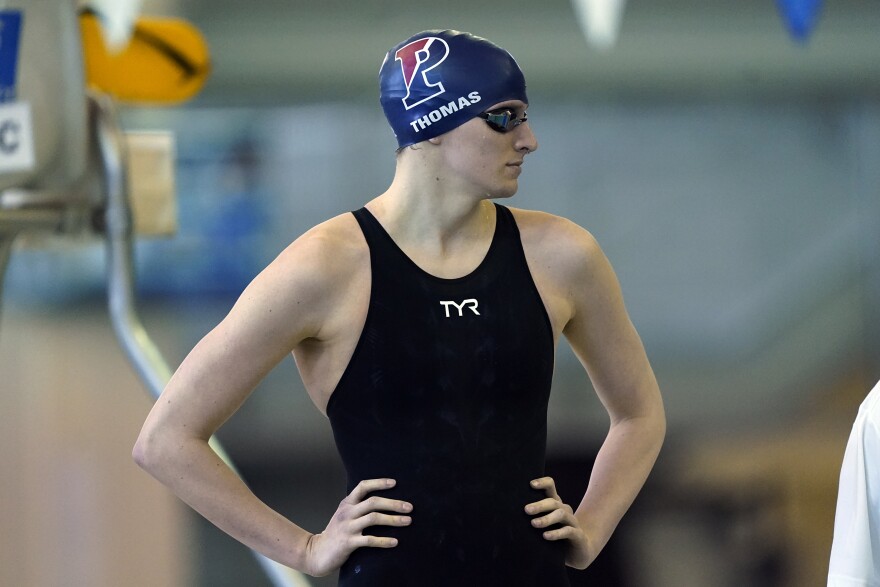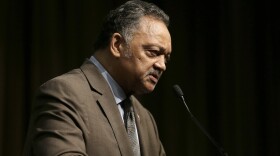Across the country, states have imposed limits on transgender athletes at the K-12 or college level in recent months. Legislators in North Carolina's Republican-controlled General Assembly appear poised to work out similar legislation in the coming weeks.
The often-heated debate puts transgender athletes at the center of an issue without a clear middle ground.
19-year-old Kit Wiedenfeld grew up in rural northeastern North Carolina. His biological sex assigned at birth was female. In high school, he identified as neither male nor female but rather as non-binary, an option he says felt safer. Once he got to North Carolina State University in Raleigh last fall, he felt he could be his true self and started looking into hormone replacement therapy, or HRT.
"It was like my first or second week here, it kind of hit me like a brick, and I was like, 'Oh my goodness, I would feel so much more comfortable identifying as a man," Wiedenfeld says.
A college freshman, Wiedenfeld says he couldn't be happier to start taking testosterone, or simply T as many in the trans community call it.
"I'm re-falling in love with myself. I'm a lot happier with myself," he says. "I didn't like to talk as much before because I didn't like the way that my voice sounds, and even though it's like crackey now, I still like talking more. And sometimes I'll laugh just to hear myself. And it's just great and I love the effects of it."
The decision to start HRT therapy did have at least one downside.
Wiedenfeld played club rugby. But, he now can't play on N.C. State's women's team because the USA Rugby governing body puts limits on testosterone levels for women's teams. If a proposed North Carolina bill becomes law, it would mean he might not be able to play on the men's team either.
"So it would pretty much just limit me to co-ed sports, which there are not a lot of, and not many that I'm interested in," Wiedenfeld says.
Nationally, and in North Carolina, conservative Republicans have pushed to ban transgender athletes from playing on their preferred team. Supporters of these bills say they are necessary primarily to protect the integrity of women's sports. That's gained traction in part through Riley Gaines, a college swimmer known for criticizing the NCAA for allowing transgender swimmer Lia Thomas to compete against her in a women's championship race.
Thomas and Gaines tied for fifth place in the women’s 200-meter NCAA championships in March 2022.

Gaines — who swam at the University of Kentucky — has spoken publicly, including at the Conservative Political Action Conference where she was introduced by former President Donald Trump.
"Basically all I want to say is that it takes a brain and common sense and fifth grade biology level understanding to realize this is blatantly unfair," Gaines said at CPAC. "It's completely obvious."
Advocacy groups and mental health experts say it's not so obvious.
Dr. Michelle Forcier is a Brown University professor of pediatrics who specializes in gender, sexual, and reproductive health for adolescent youth. Forcier says these bans fail to take into account the science — and practical experiences — of transgender athletes.
"And this ban, what it's intended to do is to demonize and exclude, and to make invisible that whole larger group of kids who just want to play sports," Forcier says.
Testosterone is stronger than estrogen, and at the elite levels of sports could be seen as a performance enhancer. But at high and middle school levels, there is such little difference that experts say there is no bearing on performance.
Furthermore, the North Carolina High School Association already has a process for transgender athletes to play sports on their preferred teams. Since the policy was enacted in 2019, there have been just 18 waiver requests, with only one application denied — according to data obtained by WUNC. There were more than 180,000 student-athletes in North Carolina public schools last school year, meaning transgender athletes make up less than 0.003%.
Forcier says the intent has nothing to do with fairness in sports.
"It's discrimination, and it's stigmatizing. And it's, again, telling them that they aren't a really valued member of our society and they can't play with other kids because they are different in a way that's bad and scary," Forcier says. "And that's cruel. That's abusive... and it's just plain wrong."
Both the North Carolina House and Senate have passed similar bills to ban transgender athletes from their preferred teams, signaling they will likely work out a compromise this session.
Wiedenfeld, the N.C. State student, says that's disappointing. But even so, it wouldn't change his mind to begin hormone therapy.
"Every trans person thinks about, like, is it worth it?" he says. "And, it is. It is really worth it. It's changed my life for the better. And I can't imagine a life where I never took HRT and I was just sad forever thinking that, like, I was some — as society puts it — mistake."
At the federal level, the Biden Administration has proposed a rule that allows for some restrictions on transgender athletes. But it doesn't allow schools to categorically ban transgender athletes from participating in sports of their preferred gender.







